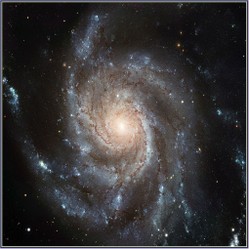How many stars are there in the universe? Nobody knows the answer to that, but – as Steve Rogerson explains here - we can prove mathematically that the number of stars must be finite rather than infinite as some claim. And the basis of this proof is standing outside and looking up into the night sky.

Why we know the number of stars in the universe is finite
A simple proof to show the number of stars in the universe is finite
 A finite number of stars in an infinite universe Photo from NASA |
Some people have argued that because the universe is infinite, therefore the number of stars within the universe must also be infinite. But a simple look up into the night sky (or the day sky come to that) offers a simple proof that the number of stars must be finite.
If there was an infinite number of stars in the universe, you would be blinded every time you looked up into the sky. Quite simply, an infinite number of stars would produce an infinite amount of light.
But not all the light reaches the Earth
Ah, but surely a lot of the light is lost on the way, absorbed into other bodies, deflected, reflected and so on. Thus not all the light that is created reaches the Earth.
True, not all the light reaches the Earth but some of it does, and that is the key point of the proof. If no light from the stars reached the Earth, it could be argued that the number of stars was infinite and something was stopping that light getting here.
However, some light from the stars does the reach the Earth. By definition, that must be a percentage of the total light that is created. Now, part of the basic maths of infinity states that any percentage of infinity is in itself infinity. So, 50% of infinity is also infinity, as is 0.5%, or even 0.000000005%. No matter how small the proportion, it must still be infinity.
Now, the amount of light that does reach the Earth from the stars has to be a proportion of the light that is created, even if it is a very small proportion. If there were an infinite number of stars thus creating an infinite amount of light it would therefore follow that the percentage of that light reaching Earth would also be infinite. But we know that the amount of light reaching Earth is finite – because we are not blinded when we look up in the sky – therefore the total amount of light created by the stars must also be finite. Therefore, the number of stars in the universe is also finite.
You might also like
Why do buses bunch?You wait half an hour for a bus and then three come along at once. But why?
All About the Big Bang TheoryThe universe got created according to the principles of Big Bang theory. Like...






 KZine Issue 31: Review of October 2021 Issueon 11/07/2021
KZine Issue 31: Review of October 2021 Issueon 11/07/2021
 KZine Issue 30: Review of June 2021 Issueon 07/05/2021
KZine Issue 30: Review of June 2021 Issueon 07/05/2021
 KZine Issue 29: Review of February 2021 Issueon 02/23/2021
KZine Issue 29: Review of February 2021 Issueon 02/23/2021
 KZine Issue 28: Review of September 2020 Issueon 10/01/2020
KZine Issue 28: Review of September 2020 Issueon 10/01/2020



Comments
SteveRogerson, Thank you for product lines, pretty pictures and practical information.
This is an interesting argument for finite stellar numbers be they in finite or infinite universes. I like the line-of-sight argument in whatever direction one looks. But I really like this one, which is so simple to put forth and to defend.
Would you be tending toward a finite or an infinite universe?